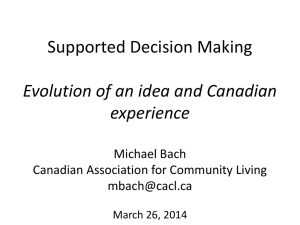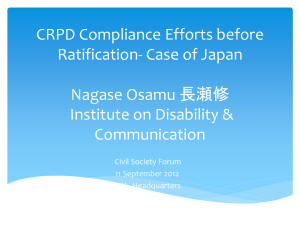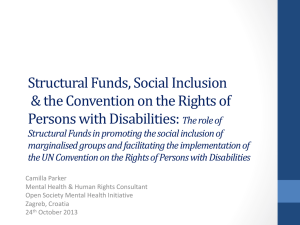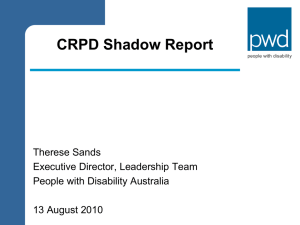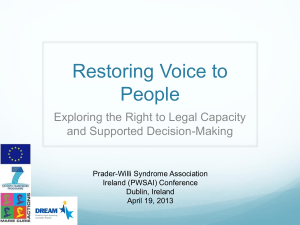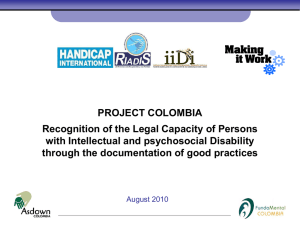Executive sum - International Disability Alliance
advertisement
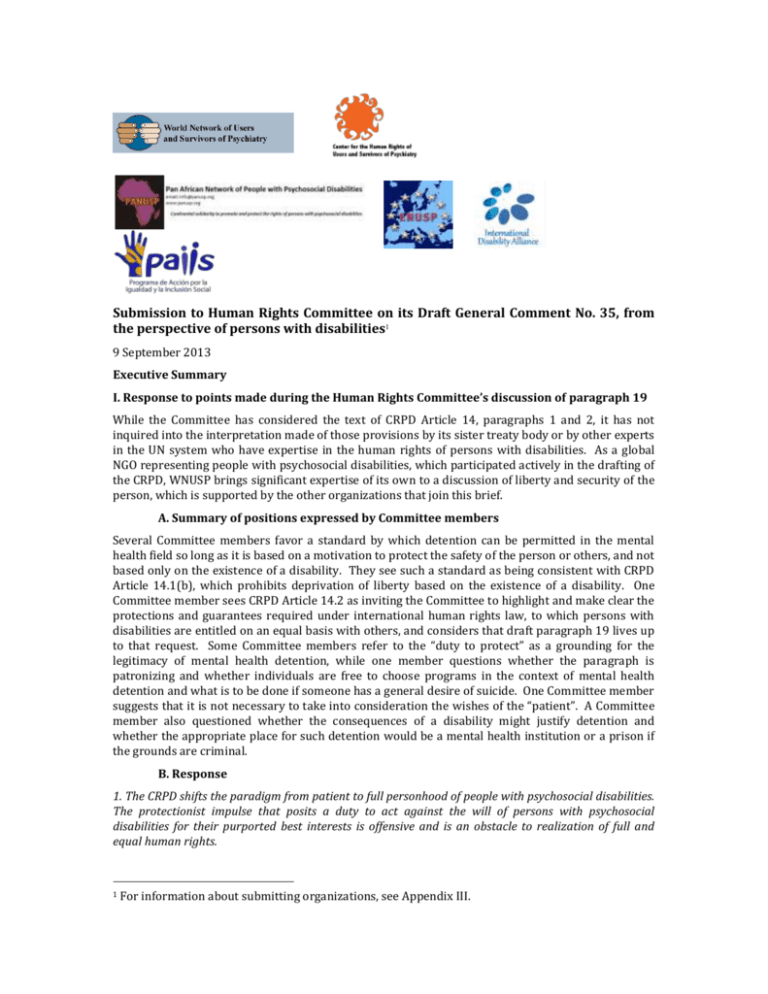
Submission to Human Rights Committee on its Draft General Comment No. 35, from the perspective of persons with disabilities1 9 September 2013 Executive Summary I. Response to points made during the Human Rights Committee’s discussion of paragraph 19 While the Committee has considered the text of CRPD Article 14, paragraphs 1 and 2, it has not inquired into the interpretation made of those provisions by its sister treaty body or by other experts in the UN system who have expertise in the human rights of persons with disabilities. As a global NGO representing people with psychosocial disabilities, which participated actively in the drafting of the CRPD, WNUSP brings significant expertise of its own to a discussion of liberty and security of the person, which is supported by the other organizations that join this brief. A. Summary of positions expressed by Committee members Several Committee members favor a standard by which detention can be permitted in the mental health field so long as it is based on a motivation to protect the safety of the person or others, and not based only on the existence of a disability. They see such a standard as being consistent with CRPD Article 14.1(b), which prohibits deprivation of liberty based on the existence of a disability. One Committee member sees CRPD Article 14.2 as inviting the Committee to highlight and make clear the protections and guarantees required under international human rights law, to which persons with disabilities are entitled on an equal basis with others, and considers that draft paragraph 19 lives up to that request. Some Committee members refer to the “duty to protect” as a grounding for the legitimacy of mental health detention, while one member questions whether the paragraph is patronizing and whether individuals are free to choose programs in the context of mental health detention and what is to be done if someone has a general desire of suicide. One Committee member suggests that it is not necessary to take into consideration the wishes of the “patient”. A Committee member also questioned whether the consequences of a disability might justify detention and whether the appropriate place for such detention would be a mental health institution or a prison if the grounds are criminal. B. Response 1. The CRPD shifts the paradigm from patient to full personhood of people with psychosocial disabilities. The protectionist impulse that posits a duty to act against the will of persons with psychosocial disabilities for their purported best interests is offensive and is an obstacle to realization of full and equal human rights. 1 For information about submitting organizations, see Appendix III. 2. According to the Committee on the Rights of Persons with Disabilities, mental health detention violates the CRPD; two Special Rapporteurs on Torture and the High Commissioner for Human Rights agree. Such detention furthermore amounts to ill-treatment or torture. The Special Rapporteur on Torture and High Commissioner for Human Rights hold that mental health detention cannot be justified based on a motivation to protect the safety of the person or others. Furthermore, nonconsensual interventions in the field of mental health cannot be justified based on the good intentions of medical professionals. 3. Persons with psychosocial disabilities remain subject to criminal law on an equal basis with others. CRPD Articles 12, 13 and 14 articulate an equality-based paradigm for holding persons with disabilities responsible for offenses against the law. In criminal proceedings and in conditions of detention, persons with disabilities must be provided with procedural accommodation and other reasonable adjustments, and must be treated in compliance with the objectives and principles of the CRPD. Mental health institutions, contrary to common beliefs, are not a less harsh alternative to prison; as observed by the Special Rapporteurs on Torture and by advocates, such detention inflicts severe suffering. 4. The continued application of outdated and discriminatory standards to the rights of persons with disabilities will result in violation of Article 2 of the Covenant, which guarantees equal enjoyment of rights irrespective of any status. C. Additional issues to be addressed in the General Comment 1. Nonconsensual psychiatric interventions violate the right to security of the person and amount to illtreatment or torture. The jurisprudence developed in support of this emerging norm by treaty bodies and by Special Rapporteurs on Torture provides compelling justification for this Committee to adopt a categorical standard prohibiting nonconsensual psychiatric interventions and requiring that all mental health services must be based on free and informed consent of the person concerned. 2. The right to liberty of movement and freedom to choose one’s residence overlaps with the right to liberty of person. For persons with disabilities this entails the right to live independently and be included in the community, with the same choices as others, as provided for in CRPD Article 19. States must phase out and eliminate institutional systems of care and directly channel resources into community-based supports and services that meet expressed needs of persons with disabilities and that respect the person’s autonomy, choices, dignity and privacy. D. Conclusion The Convention on the Rights of Persons with Disabilities, as a core human rights treaty elaborating the obligations of governments to ensure that all persons with disabilities enjoy all human rights and fundamental freedoms on an equal basis with others, constitutes authoritative guidance for all human rights mechanisms. Not only the CRPD text, but also the interpretations made by the Committee on the Rights of Persons with Disabilities and by experts who have developed standards based on the CRPD in thematic areas such as the freedom from torture and ill-treatment, form part of the relevant authoritative guidance. In addition, following the directive under CRPD Article 4.3 to “closely consult” and actively involve persons with disabilities through their representative organizations, human rights mechanisms applying the CRPD should carefully consider the positions of organizations of persons with disabilities, which reflect expertise in the subject matter as well as the concerns of those whose human rights are directly affected. Draft paragraph 19 of the General Comment is inconsistent with the standards of the CRPD, including CRPD Article 14, which directly elaborates on the right of persons with disabilities to enjoy liberty and security of the person on an equal basis with others. The CRPD unlike earlier non-binding declarations prohibits detention on mental health grounds, including when additional factors or motivations, such as prevention of harm to the person or others, are added. As the negotiating parties rejected amendments to the text that would have permitted such detention, it is highly improper to reinterpret the CRPD as reverting to the older, discriminatory standard. In the following sections of this paper, WNUSP has commented in detail on paragraph 19 and has suggested alternative language that would comply with the CRPD. II. Detailed commentary on paragraph 19 19. [States parties should explain in their reports what they have done to revise outdated laws and practices in the field of mental health in order to avoid arbitrary detention. 2 [Note that all internal footnotes are retained and renumbered] First sentence is not objectionable in itself. Any deprivation of liberty must be necessary and proportionate, for the purpose of protecting the person in question or preventing injury to others, must take into consideration less restrictive alternatives, and must be accompanied by adequate procedural and substantive safeguards established by law.3 This sentence reflects outdated standards that have been superseded by the Convention on the Rights of Persons with Disabilities. While earlier standards such as the non-binding Principles for the Protection of Persons with Mental Illness and for the Improvement of Mental Health Care (46/119) accepted detention on mental health grounds subject to procedural and substantive safeguards, CRPD Article 14 prohibits detention based on the existence of a disability, and makes no exception for detention in the mental health field based on a motivation to protect the safety of the person or others. See Appendices I and II. In order to avoid arbitrary detention in the field of mental health, detention on mental health grounds or in mental health facilities must be prohibited by law and abolished in practice. The procedures should ensure respect for the views of the patient, and should ensure that any guardian or representative genuinely represents and defends the wishes and interests of the patient.4 This sentence fails to reflect the standard of full and equal legal capacity that is guaranteed to persons with psychosocial disabilities under the CRPD. The Committee on the Rights of Persons with Disabilities holds that mental health services must be based on the free and informed consent of the person concerned; this standard is also reflected in the jurisprudence of two Special Rapporteurs on Torture. The Committee on the Rights of Persons with Disabilities furthermore holds that guardianship must be abolished and replaced by supported decision-making, which respects the person’s autonomy as well as his or her will and preferences. See Appendices I and II. States parties must provide programmes for institutionalized persons that serve the purposes that are asserted to justify the detention. 5 This sentence assumes the legitimacy of mental health detention, contrary to its prohibition under the CRPD. It should be noted that the programs typically provided in psychiatric institutions to serve purposes such as “care and treatment” or “protection of the person or others” are measures such as restraint, solitary confinement, and non-consensual administration of electroshock, mind-altering drugs such as neuroleptics, or psychosurgery, which amount at least to inhuman or degrading treatment and arguably meet the criteria for torture, according to Special Rapporteur on Torture Juan E. Méndez. See Appendix I. Deprivation of liberty must be reevaluated at appropriate intervals with regard to its continuing necessity.6 See Concluding observations Estonia 2003, para. 10. 1062/2002, Fijalkowska v. Poland, para 8.3; 1629/2007, Fardon v. Australia, para. 7.3; Concluding observations Canada 2006, para. 17; Russian Federation 2010, para. 19; Bulgaria 2011, para. 17. 4 Concluding observations Czech Republic 2007, para. 14; Bulgaria 2011, para. 17; see also Committee on the Rights of the Child, General comment No. 9, para. 48. 5 Concluding observations Bulgaria 2011, para. 10, Germany 2012, para. 14. 2 3 This sentence assumes the legitimacy of detention in the field of mental health, contrary to its prohibition under the CRPD. It should be noted that indefinite detention, far from being conducive to mental health, produces fear and anxiety, is linked to self-harm and suicidality as well as trauma, and constitutes a factor that warrants the characterization of mental health detention as ill-treatment or torture. See Appendix I. Patients should be assisted in obtaining access to effective remedies for the vindication of their rights, including initial and periodic judicial review of the lawfulness of the detention, and to ensure conditions of detention consistent with the Covenant. 7 ] This sentence assumes that mental health detention can be considered lawful, contrary to the CRPD which requires the repeal of legal provisions that authorize such detention. See Appendix II. The proper standard would be that any person subjected to mental health detention must have a remedy to secure their immediate release along with compensation and other forms of reparation for the unlawful detention. 754/1997, A. v. New Zealand, para. 7.2; Concluding observations Canada 2006, para. 17; Committee on the Rights of the Child, General comment No. 9, para. 50. 7 1062/2002, Fijalkowska v. Poland, para 8.3-8.4; 754/1997, A. v. New Zealand, para. 7.3; Concluding observations Russian Federation 2010, para. 19; Bulgaria 2011, para. 17; General Comment No. 31, para. 15. 6 III. Recommendation for alternative language to substitute outdated standards in draft paragraph 19 of General Comment No. 35: States parties should explain in their reports what they have done to revise outdated laws and practices in the field of mental health in order to avoid arbitrary detention. 8 [Original footnote renumbered] Rationale: the first sentence of draft paragraph 19 is acceptable and sets out the topic under discussion. Persons with psychosocial and intellectual disabilities have the right to liberty and security of the person on an equal basis with others.9 This includes the right to live independently and be included in the community, with choices equal to those of others,10 and the right to be free from detention that is unlawful, arbitrary, or based on the existence of a disability. 11 Rationale: this proposal substitutes language based on the text of the CRPD, which is equality-based and focuses on persons with disabilities as rights-holders and full members of society. Detention based on a disability constitutes discrimination. 12 However, persons with disabilities remain subject to detention on grounds unrelated to the disability itself, such as criminal arrest or conviction.13 Legislation must provide for the same penalties, under the same guarantees and conditions, for persons with disabilities as are applied to others who are the subject of criminal proceedings. 14 Any security measures applied to persons with disabilities must not be based on the existence of a disability but instead must be based on disability-neutral grounds and procedures.15 Persons with disabilities have the right to be provided with reasonable accommodation in proceedings related to detention and in the conditions of detention, including support for the exercise of legal capacity and other desired supports and services related to the disability.16 Rationale: CRPD does not exempt persons with disabilities from detention or security measures, but requires that any detention be based on grounds and procedures that apply to the population as a whole, rather than disability-specific ones. Mental health professionals can have no role in determining the application of detention or security measures to any individual; such involvement means that disability is being used as a factor to justify the detention, contrary to CRPD Article 14. Persons with disabilities are entitled to respect for their physical and mental integrity on an equal basis with others,17 both when detained and when not detained. 18 Forced and nonconsensual psychiatric interventions are prohibited under international law and must be eliminated.19 Rationale: this proposal gives full effect to the right of persons with psychosocial disabilities to See Concluding observations Estonia 2003, para. 10. CRPD Article 14.1(a). 10 CRPD Article 19. 11 CRPD Article 14.1(b). 12 CRPD Article 2, definition of “discrimination based on disability”. 13 CRPD Article 14.2; see also Article 12.2 and Article 13; OHCHR study A/HRC/10/48, para 49. See also OHCHR Information Note No. 4 on Detention and Persons with Disabilities. 14 Adaptation of CRPD/C/PRY/CO/1 para 32; OHCHR study A/HRC/10/48, para 47; see also OHCHR Information Note No. 4 on Detention and Persons with Disabilities. 15 CRPD Article 14. 16 CRPD Article 14.2. 17 CRPD Article 17. 18 Draft GC No. 35 para 8. 19 A/HRC/22/53 para 89(b). 8 9 security of the person. States must eliminate institutional systems of care for persons with disabilities, 20 and must make available community-based supports and services that meet needs expressed by persons with psychosocial disabilities and that respect the person’s autonomy, choices, dignity and privacy.21 While there is an immediate obligation to refrain from disabilitybased detention and institutionalization, re-allocation of resources may be needed in order to prevent institutionalization that is caused by lack of available services in the community. 22 Rationale: this proposal complements the prohibition of disability-based detention with a positive obligation to eliminate institutional systems of care and make services available that fulfill human rights requirements in the community. CRPD/C/CHN/CO/1 para 26. CRPD/C/CHN/CO/1 para 38. 22 CRPD Article 4.2; CRPD/C/CHN/CO/1 para 26; CRPD/C/HUN/CO/1 paras 34-35; A/HRC/22/53 para 89(b). 20 21 Annex: Information about submitting organizations The World Network of Users and Survivors of Psychiatry (WNUSP) is an international organisation of users and survivors of psychiatry, advocating for human rights of users and survivors, and representing users and survivors worldwide. 23 The organisation has expertise on the rights of children and adults with psychosocial disabilities, including on the latest human rights standards set by the CRPD, which it played a leading role in drafting and negotiating. WNUSP is a member organisation of IDA and has special consultative status with ECOSOC. WNUSP supports its members to advocate before UN treaty bodies, and has provided expertise to UN bodies including the Special Rapporteur on Torture, the Subcommittee on Prevention of Torture and the Committee on the Rights of Persons with Disabilities. WNUSP is currently engaged with processes for review of the Standard Minimum Rules on the Treatment of Prisoners and for the development of an instrument on the rights of older persons. Jolijn Santegoeds and Salam Gomez, Chairs admin@wnusp.net www.wnusp.net The Center for the Human Rights of Users and Survivors of Psychiatry (CHRUSP) provides strategic leadership in human rights advocacy, implementation and monitoring relevant to people experiencing madness, mental health problems or trauma. In particular, CHRUSP works for full legal capacity for all, an end to forced drugging, forced electroshock and psychiatric incarceration, and for support that respects individual integrity and free will. CHRUSP regularly provides technical support to the World Network of Users and Survivors of Psychiatry (WNUSP) through the work of the CHRUSP President as WNUSP International Representative. Tina Minkowitz, Esq. tminkowitz@earthlink.net www.chrusp.org The Pan African Network of People with Psychosocial Disabilities (PANUSP) is a continental organisation established in 2005 to represent the legitimate voice of people with psychosocial disabilities and users and survivors of psychiatry in Africa. PANUSP aims to increase continental solidarity. PANUSP functions as an advocacy mechanism that is dedicated to social justice, human rights, empowerment, social development and the full participation and inclusion of all people with psychosocial disabilities in Africa. Robinah Alambuya, Chairperson robinahalambuyahoo@yahoo.com info@panusp.org (Secretariat PANUSP: Annie Robb) www.panusp.org The European Network of (Ex-) Users and Survivors of Psychiatry (ENUSP) is the grassroots, independent representative organisation of mental health service users and survivors of psychiatry at a European level. ENUSP’s members are regional, national and local organisations and individuals across 39 European countries. Since its foundation in 1991, ENUSP has campaigned for the full human rights and dignity of mental health service users and survivors of psychiatry and the abolition of all laws and practices that discriminate against us. ENUSP is currently a consultant to the European Commission, the European Union Fundamental Rights Agency, and the World Health In its statues, “users and survivors of psychiatry” are self-defined as people who have experienced madness and/or mental health problems, or who have used or survived mental health services. 23 Organization-Europe. ENUSP is a member of European Disability Forum (EDF) and European Patients’ Forum (EPF) and part of the World Network of Users and Survivors of Psychiatry (WNUSP). Through WNUSP, our members were active in the drafting and negotiation of the CRPD. Piotr Iwaneyko biuro_braterstwo@o2.pl www.enusp.org PAIIS (Programa de Acción por la Igualdad y la Inclusión Social - Action Program for Equality and Social Inclusion) is a human rights clinic of the Law School at the University of Los Andes in Bogotá, Colombia. Founded in 2007, it seeks to advance the rights of historically marginalized groups and engages in actions on behalf of people discriminated based on their disability status, age, sexual orientation or gender identity. It played a key role in the advocacy efforts to push the Colombian government to ratify the UN Convention of the Rights of People with Disabilities. It engages in direct representation of people with disabilities and their families including those deprived of their liberty in prisons and other institutions, conducts human rights trainings and strategic litigation. PAIIS regularly submits briefs to national courts and international bodies and it is currently engaged in the submission of a shadow report before the CEDAW Committee for Colombia's periodic report, and a submission for the review process of the Minimum Standard Rules for Prisoners. Andrea Parra, Directora al.parra241@uniandes.edu.co http://paiis.uniandes.edu.co The International Disability Alliance (IDA) is the international network of global and regional organisations of persons with disabilities (DPOs), currently comprising eight global and four regional DPOs. Each IDA member represents a large number of national DPOs from around the globe, covering the whole range of disability constituencies. IDA’s mission is to advance the human rights of persons with disabilities as a united voice of DPOs utilising the CRPD and other human rights instruments, and to promote the effective implementation of the CRPD, as well as compliance within the UN system and across the treaty bodies. Victoria Lee vlee@ida-secretariat.org www.internationaldisabilityalliance.org
